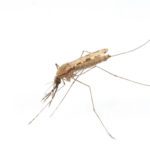Lien vers Pubmed [PMID] – 28069024
Lien DOI – 10.1186/s12936-017-1681-7
Malar. J. 2017 01; 16(1): 21
The changing malaria situation in Madagascar requires additional knowledge on the physiology and behaviour of local mosquito vectors. However, the absence of established colonies for several anopheline species present in Madagascar constitutes a limiting factor. To avoid labour intensive work and uncertainty for success of establishing Anopheles colonies from Malagasy species, field collections of blood-fed females and in-tube forced oviposition were combined to reliably produce large numbers of F1 progeny.Blood-fed females were captured in zebu stables or open zebu parks. Oviposition was induced by enclosing gravid females in eppendorf tubes as initially described for Anopheles funestus. The effect of cold anaesthesia on inducing in-tube forced oviposition and on egg yield was assessed for five Anopheles species, namely Anopheles coustani, An. funestus, Anopheles mascarensis, Anopheles arabiensis and Anopheles squamosus. The production of eggs from in-tube forced oviposition and standard egg laying in cages was compared.For the five anopheline species studied, the in-tube forced oviposition method had different efficacy ranging from 35.6 to 71.1% females willing to lay eggs in tubes. Interestingly, prior anaesthesia increased significantly the proportion of ovipositing females for An. mascarensis. Prior anaesthesia has a marginal effect on the number of eggs produced. However, the overall yield in eggs collected using the in-tube forced oviposition method largely exceeds the number of eggs that can be produced by females free to oviposit in cages.The efficiency of the method allowed the production of F1 progeny in numbers sufficiently large for developing detailed analyses of the five species tested, including behavioural studies, insecticide resistance assessment and molecular characterization, as well as vector competence studies. It should be applicable to other anopheline species difficult to colonize.


